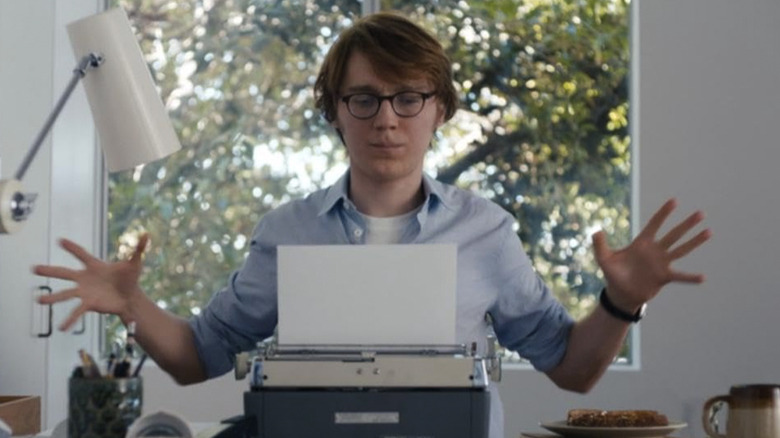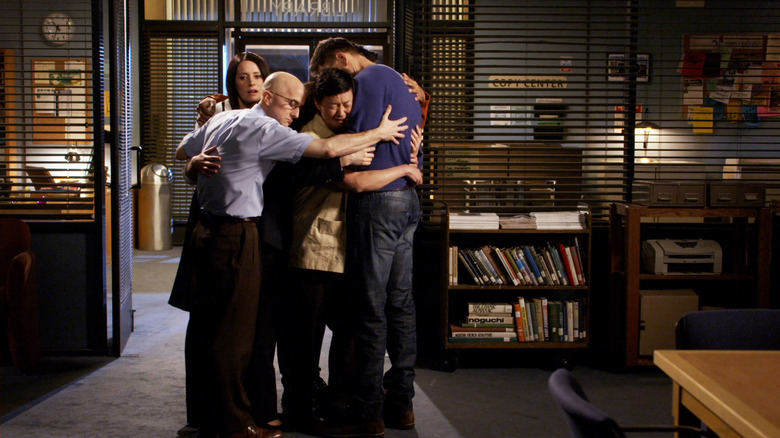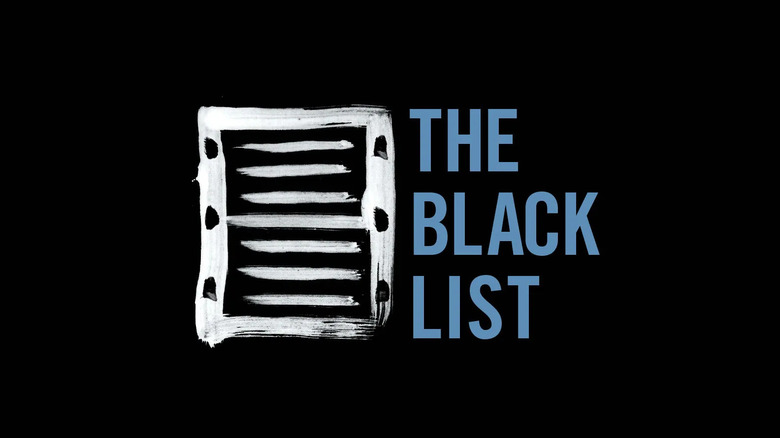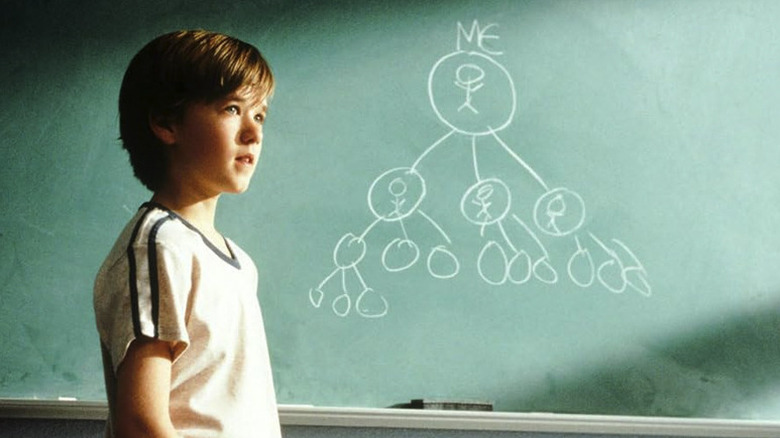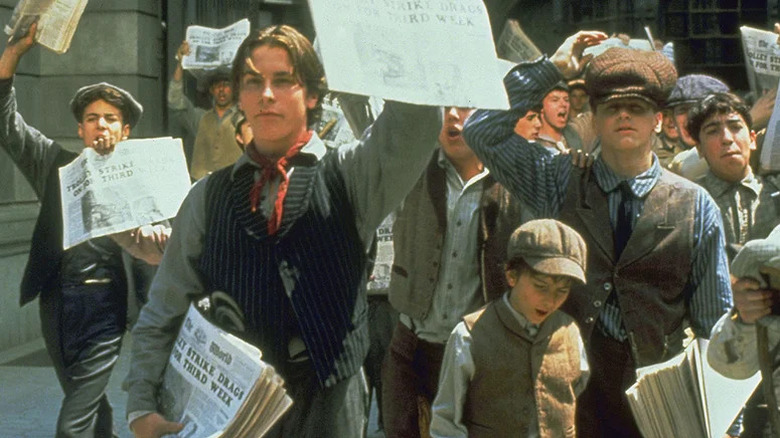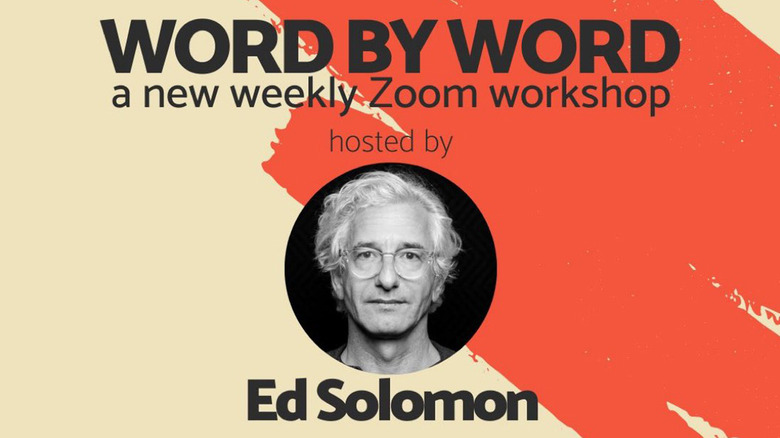A Free Zoom Series Teaches The Finer Points Of Screenwriting – And Supports Striking Writers
On June 10, 2023, screenwriter Ed Solomon ("Men in Black," "Bill & Ted's Excellent Adventure," "Full Circle") tweeted the following:
"Wanted to gauge interest on something. If I were to do a series of Zoom workshops during the strike (was thinking Q & A sessions on various parts of the craft of writing), would anyone show up?"
Within minutes, he received a DM from The Black List founder Franklin Leonard, who, along with his team, including the company's senior vice president Megan Halpern, was offering to help facilitate the types of conversations Solomon wanted to have. A couple of weeks later, Word By Word was officially up and running.
With its title taking inspiration from Anne Lamott's writing book "Bird By Bird," which Solomon calls "the best book [he's] ever read on writing," the weekly Zoom sessions are free and open to the public, feature major figures from the world of screenwriting as guests, and have served as appointment viewing for writers of all kinds and skill levels. Crucially, it's also served as a way to raise money for strike funds which provide much-needed help to folks who are affected by the ongoing work stoppages — not just writers, but crew members, people new to the industry, members of different unions, and more.
I sat down with Solomon, Leonard, and Halpern to talk a little about what they've learned since the series began, how they're feeling about the strike, and more.
Forging a community in a fraught time
With the Writers Guild's 11,000 members putting their pencils down during the strike and many of them walking the picket lines until the AMPTP (Alliance of Motion Picture and Television Producers) stops holding the entire industry hostage, the often solitary profession of writing has given way to experiences that are much more public and communal.
"One of the few good things that come out of a situation like this, which obviously no one wants to have happen, is that there's a sense of community that starts to form," Solomon said. "And what you realize is [that in addition to] the horizontal community is a vertical one, is a temporal one. Longitudinal, you could say. You're just part of a history and a tradition that's not just about sacrifices being made for those coming after, but also for the health and wellbeing of the entire creative community."
That sense of togetherness has been crucial on the picket lines, and a show like Word By Word helps writers continue that sense of community online — and learn from some of the greats in their field while they're at it. Writers as varied as Eric Roth ("Forrest Gump"), Tracy Oliver ("Girls Trip"), Jesse Armstrong ("Succession"), Neil Gaiman ("Good Omens"), Sharon Horgan ("Bad Sisters"), and Kemp Powers ("One Night in Miami") have appeared as guests, participating in wide-ranging conversations that begin with topics like "Fear, Failure, and F***ing Up" and "Outlining: A Necessary Evil?" before spinning off into much more expansive conversations about the writing process.
"You also realize that just in terms of your own craft, that there are so many different ways to do things," Solomon explained. "That's one of the reasons that The Black List and myself, in our partnership, have found that the more we can talk to voices of not just previously under- and unrepresented groups, but different ages, different ways of [writing] — the more we do that, the more we're all learning."
Why The Black List got involved
The Black List is best known for its annual list of the best-unproduced screenplays of the year, but the organization is also a valuable resource for tons of folks in the entertainment industry: They run writing labs, offer ways for screenwriters to get feedback on their scripts, and occasionally have even hosted Live Reads. (I attended one for Brian K. Vaughan's "Roundtable" in 2019, which was a lot of fun.) Now they've partnered with Ed Solomon to produce Word By Word, and I asked founder Franklin Leonard why The Black List wanted to be involved with this project.
"I think on a fundamental basis, The Black List, we see ourselves as an organization that identifies and celebrates great screenwriting and the people that do it," he said. "And what better way to celebrate great screenwriting than to share conversations among people that have done it with people who have yet to do it?"
In order to facilitate those conversations, the group turned to Zoom. Halpern explained the technical benefits of doing Word By Word live on that platform rather than releasing it as a podcast.
"We spend the first hour, Ed chats with our guests. It's kind of like we're eavesdropping on the three or four of them at a bar or a restaurant. And during that entire conversation, everybody in the audience gets to drop their questions into the Q&A box in the show. So, then the second half of the show is us asking audience questions to Ed and the group, which I think makes it feel really participatory, and we can be really specific and we can talk about things from the first part of the episode that are really intriguing to the audience. Also, we can see the direction they prefer us to take the conversation with their questions based off the theme or whatever it is. And I think that people have really appreciated that. I think it feels really intimate when you get to do that."
Helping those affected by the strikes
When WGA members aren't out walking the picket lines, what are they to do? Word By Word not only helps provide a sense of appointment viewing and gives some value to those suffering at the hands of the studios, but it also helps facilitate financial contributions as well. "Aside from all of the selfish joy we're getting from doing these things, we're trying to do two things: Build community and raise money for people who are affected by this labor action that nobody wanted but was unable to avoid it, it appears," Solomon said. "And both of those, I think, are served by being live. It becomes, by its own nature, a communal activity and creates an intention to be there live with a group."
In terms of raising money, Word By Word viewers have donated tens of thousands of dollars to multiple strike funds. "When we started thinking about how can we help those that are being affected that aren't just the writers, Susanna Fogel and Lena Dunham were our first guests and they were in the process, I think maybe just the day before, had announced TUSC, The Union Solidarity Coalition, which they had set up specifically to serve IATSE members who were losing their health insurance because they weren't making their hours because of the shutdowns," Halpern said.
Another fund they support is the Entertainment Community Fund, formerly known as The Actors Fund, which was founded in the 1880s and was especially helpful during the early days of the pandemic. The third fund was formed during the Pay Up Hollywood movement (a movement designed to shine a light on the pay inequities and abuses suffered by Hollywood assistants) and was originally called the Pay Up Hollywood Fund, but has since been rebranded.
"They relaunched it during the strike as the Hollywood Support Staff Relief Fund, knowing that so many folks that weren't qualified for the Entertainment Community Fund — I think you have to have worked in the business for four years or more — would desperately need support as all these writers' rooms were shutting down," Halpern said. "So, writers' assistants and showrunners' assistants and writers' PAs and all that ... I'm sure there are a lot of great organizations out there, but those are the three we're really focused on that seem to have meaning to us and have meaning to our community."
Halpern also pointed out that while Word By Word has been a great way to elicit donations for these funds, it's also been a conduit to point people to the help they need. "I think as the show has gone on, we've also seen that by promoting fundraising for these funds, there are a lot of folks that listen to the show that need these grants and need this access. So we've also been trying best as we can to remind people that they exist if they need support."
Strike check-in
I spoke with the trio a few days after the AMPTP had leaked its proposal to the WGA to the media, and I wanted to take the temperature of the room and see how Solomon was feeling about the status of the strike as a way to create a sort of snapshot of this moment in time. He acknowledged that not every writer in the guild is on the same page about every single issue, but said he has not felt the slightest "eroding of resolve" across the entire strike so far. "To me, a sign of strength is the ability to argue in support of your ideas while still embracing the objective of the entire community."
"Unlike the people against whom we're negotiating or trying to negotiate, we're not being paid to do this," he said. "The people on the other side of the table are making millions of dollars. If you combine the salaries of all those labor representatives on the other side of the table and the AMPTP and their negotiating team, they're making their millions of dollars a month and we're sacrificing whatever our personal salaries are, risking our homes, having to downsize the way we live, no matter who you are on this. And those are the people taking the real risks, the people who are out walking the picket line, the people who we're trying to help with this, people who are affected by those who are being forced to walk this picket line."
Meanwhile, Leonard called the resolve of the writers' community "inspiring," and said it's "a reminder just how important their work is and how much they bear the weight of this industry, even when they haven't been remunerated for it."
Solomon also underlined the sacrifices folks are making during this historic time and had some advice for the AMPTP. "I think the more they dig themselves in by continually trying to re-spin their stories, the more angry I've noticed people become. Because these people who are out on the lines are making the real sacrifices. They're actually quite literally walking the walk. And when you're doing that day by day and then you're watching people try to 'spin your story,' it's enraging."
The studios leaked their proposal to the press in a naked attempt to divide the guild (the hope being that some of the more suffering members would put pressure on guild leadership to accept the studios' lackluster terms instead of holding out for a deal that properly addresses the guild's concerns). So far, that tactic has not worked. And in the aftermath of the negative reaction to that attempt, the AMPTP hired a "crisis" PR firm to represent them and a profile of AMPTP lead negotiator Carol Lombardini was written in The New York Times. Some guild members rolled their eyes at that article, but Solomon told me he actually welcomes coverage like that.
"[The AMPTP] got a lot of pushback for trying to make articles to 'humanize' themselves. I'm actually all for them humanizing themselves as much as possible, because it gives light to the idea that they can hide behind this statement they always make, which is, 'It's things that are out of our control. The business is changing. The world is just changing. This is just the way it is.' When in fact, all of these things that are happening are the result of individual decisions made by individual human beings about individual issues that affect other human beings just like them. Not just other human beings just like them, the human beings who are creating, and with the actors and with the directors and with the crew, are not just an essential part of the ecosystem, but the ecosystem that they're destroying and don't even understand because they don't know the business that they're in that well anymore."
Word By Word goes deeper than typical writing conversations
While Word By Word listeners will hear countless pieces of writing advice and insight into the processes of its guests, it is not a typical screenwriting show. "From the get-go, Ed was very clear that we weren't going to talk about anything that you could read in a book," Halpern said. "It wasn't going to be some rehashing of any sort of written down Save the Cat or whatnot, as helpful as I'm sure those are." Leonard said the aspect that he's "personally most proud of" about Word By Word is that the conversations "go a lot deeper" than viewers expect. "That was always the goal, but the fact that that is the thing I think most people come away from these conversations saying [is gratifying]," he remarked.
Many screenwriting shows will lay out what can sometimes feel like structural obligations for a script: This thing has to happen by page X, this other thing needs to happen at the end of Act 2, etc. But for Franklin Leonard, those elements aren't quite as crucial as they may seem. "I was a studio executive and a production company executive for years," Leonard said. "Hitting those marks is not the thing that matters. The great writing is a great story well told, and a lot of that advice comes from boiling down these things. A three-act structure is a beginning, middle, and end. What do a beginning and middle and end mean? How do you get there? How do you recognize what they are? Those are the conversations that I feel like Ed has led."
For Solomon, hosting these talks with other writers has been an invigorating way to re-approach his craft. "What I really took from this in one big way is just how different everyone's process is and just how much I have come to misunderstand what I thought was my process, but in fact were just habits that I had formed. So, speaking to all these other people, many of whom are struggling with the same things I'm struggling with but have different tools with which to fix these things or to better tinker with some of these issues, has really broken me out of, I would say, a routine or a way of thinking about the way I approach my work."
That distinction between process and habits rang especially true to me, and can apply not just to screenwriting, but to many other aspects of life. That's just the tip of the iceberg when it comes to the insights you'll find in each episode of Word By Word. If you have the means, consider donating to The Union Solidarity Coalition, the Entertainment Community Fund, and/or the Hollywood Support Staff Relief Fund.
